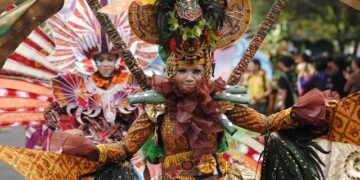The unauthorised updated biography of Dr Anton Rupert has been released.
Titled Anton Rupert: The Life of a Business Icon, it contains riveting details of his fight for “partnership and co-existence”; his empowerment of Black entrepreneurs – and women; his stance on the relationship between politics and business; his practice of corporate social responsibility; and his philosophy on life.
In this interview with BizNews, the author Dr Ebbe Dommisse, reveals what Dr Rupert would have made of South Africa’s current leaders, and what the country might have looked like if he had entered politics.
Sign up for your early morning brew of the BizNews Insider to keep you up to speed with the content that matters. The newsletter will land in your inbox at 5:30am weekdays. Register here.
By Chris Steyn
Here is the Q & A in full:
Q: There are many people who are under the impression that Dr Anton Rupert benefited from Apartheid rule. What do you say about that in your book?
A: On the contrary, successive Nationalist governments were hostile to his views and ideas. Early on in the 1940s, having started with only £10 of his own money, he had a small tobacco business in Johannesburg but was held back by wartime rationing. He could only produce pipe tobacco. The lucrative trade in cigarettes was restricted by a quota system favouring existing companies – until his magazine published an article in 1949, ‘Quotas are killing us’ that infuriated the newly-elected Nationalist government. Further clashes followed later on.
Q: You also write in detail about the epic clashes between Dr Rupert and the late President P W Botha of the National Party as well as Dr Hendrik Verwoerd, the architect of Apartheid. What beliefs and convictions on the part of Dr Rupert caused such major disagreements?
A: Two big issues were Rupert’s belief in partnership and co-existence. The latter stemmed from his realisation that, after the first atom bomb used in wartime destroyed Hiroshima in 1945, mankind had to co-exist ‘like scorpions in a bottle’.
Furthermore, his experience with business partnerships convinced him that the concept should be extended to the field of politics to provide jobs and prosperity for all.
He clashed with Verwoerd in 1959 over his plan to establish a factory in Paarl in partnership with Coloured people. When he informed Verwoerd that whites in the factory would work under a Coloured board, exactly as in Rembrandt’s overseas factories, Verwoerd was enraged and said, in that case, he would close the factory.
Later, another serious disagreement occurred when Rupert wanted to establish industries in the Transkei. Verwoerd argued that ‘white capital’ in the homelands would be ‘economic imperialism’ creating ‘little Hongkongs’ around South Africa. Today, a wise government would gratefully accept ‘little Hongkongs’ on the border instead of the basket case of Zimbabwe.
After PW Botha’s Rubicon speech in 1985, Rupert sent a private letter to the president about Apartheid, ‘that word for which we have been crucified.’ He wrote: ‘Apartheid is seen by too many as a transgression against humanity − the neo-Nazism of a Herrenvolk.’ He made an impassioned appeal to Botha: ‘Reaffirm your rejection of Apartheid. It is crucifying us; it is destroying our language; it is degrading a once heroic nation to be the lepers of the world. Remove the burden of the curse of a transgression against mankind from the backs of our children and their children …’ Botha’s response was negative. Sadly, Rupert was once again ahead of his time.
 The author Dr Ebbe Dommisse
The author Dr Ebbe Dommisse
Q: What was Dr Rupert’s stance on the relationship between business and politics?
A: Rupert steered clear of direct involvement in party politics but proclaimed his views on coexistence and partnership wherever he could. These concepts were his most important business philosophies
Q: Was he a pioneer in business and public life?
A: Indeed, especially in the empowerment of women and black entrepreneurs.
He established the first South African company owned and run by women, First National Tea and Coffee Factories Limited, in the male-dominated business world of 1955 – nearly a decade before activists such as Germaine Greer started campaigning for equal rights for women. Rupert recognised that women were important consumers who mostly did the household shopping – purchasing the family’s clothing, groceries, crockery and furniture – and thus needed to take their rightful place in commercial trade. He also foresaw a major role for women in tourism and agriculture, especially if communal land ownership could be transformed by allocating land to female farmers on leasehold.
In 1963, Rupert’s company, Rembrandt made a decision that caused a sensation both locally and internationally: to pay a minimum wage of R2 (£1) per day, besides fringe benefits, to every worker, irrespective of race and colour. Despite criticism from rivals and the agricultural sector, labour unions hailed the move as a trail-blazing event, and thereafter many other companies followed the Rembrandt example.
In 1979, at the instigation of his son Johann, who strongly believed that small business is the real creator of jobs and prosperity, Rupert founded the Small Business Development Corporation (today Business Partners), assisting thousands of black entrepreneurs to develop their undertakings. He also partnered with Harry Oppenheimer in the founding of the Urban Foundation to improve life in black townships.
Read more: John Micklethwait: Why this is SA’s most important election since Apartheid
Q: If a man, as influential as himself, had entered politics, how might South Africa have looked today?
A: It would have been a very different country. Rupert’s belief in the ability of private initiative to create employment
and wealth probably would have achieved much better results than the outdated model of centralisation of power and social engineering with which the ruling party has persisted.
Ann Bernstein of the Center for Development and Enterprise recently commented that poor governance, not bad luck, is behind SA’s jobs catastrophe, the country’s deepest and most fundamental crisis. She said the figures are truly astounding: from January 2008 to December 2023 the number of working-age adults rose by almost 9.5 million, while the number of people in employment rose by only 2.3 million. This resulted in an increase in the nonworking population from 7.2 million to 24 million.
Rupeter advocated production by the masses as opposed to
mass production. He strongly believed that private initiative and free enterprise found their best expression in small business ventures, thereby creating many more jobs than the state and big conglomerates.
Q: Dr Rupert once compiled a list of requirements for leadership. What were those?
A: He believed that a good manager lives by ‘a code of values that emanates from his ethical and spiritual life’. It includes the qualities of honesty, integrity, trustworthiness, loyalty, humility, sincerity and steadfastness. ‘In any business enterprise that is intent on long-term survival, honesty is indeed the best policy. And we should remember that while it takes long to build up a good reputation, that good reputation can vanish in a moment because of one misdeed. Trustworthiness is only proved over time. Loyality is one of the finest assets in life – the one quality that cannot be bought with money and has to be earned. It is a quality of character that I prize above all others.’
He admired Gen Charles de Gaulle of France as a remarkable example of leadership, quoting him as follows: ‘Whatever commands the leader gives, they must be clothed in shining nobility. He must aim high, demonstrate his vision, act on a large scale and establish his authority …’
Read more: RW Johnson: Amandla – meet Zuma’s Russian-funded media business
Q: What do you think he would have made of South Africa’s current leaders?
A: He had high regard for (former President) Nelson Mandela, but I am pretty sure that he would have been less than complimentary about the present government leaders. Their actions are widely regarded as tantamount to that of a criminal syndicate, with rampant corruption, theft, and also damaging incompetence among deployed cadres.
Q: If he were still around, what do you believe his political stance would have been in the run-up to the election?
A: Rupert was a very private person, and it is doubtful whether he would have publicly told people which particular political party rather than general trends he would support.
Q: How did Dr Rupert define corporate social responsibility?
A: He emphasised his theme of a company’s threefold responsibility: to its shareholders, its employees and the community. Without a profit motive, he said, development got bogged down in excessive centralisation and bureaucracy. Profit was also the yardstick for efficiency; it generated the money that paid taxes to fund development projects and services.
Two extremes must be avoided: on the one hand for businesses to concentrate exclusively on profit maximisation, on the other hand, the radical trend to blame all social ills on business and advocate state control.
Within the framework of the free-enterprise system, ‘the contract between business and society should be expanded so that social responsibility becomes an additional function of the private sector’.
To this day, Rupert Trusts donate to institutions in fields ranging from the arts and music to nature conservation, historic buildings and education.
Q. How would you encapsulate his philosophy on life?
A: Probably by quoting one of his most famous sayings: ‘In southern Africa you cannot escape being your brother’s keeper; we cannot sleep if our starving neighbours cannot eat.’ Also, another one that inspired him: “He who does not believe in miracles is not a realist.’
Read also:
Campaign for Home Rule: Advocating for provincial autonomy in SA – Woode-Smith
How poor governance has caused SA’s unemployment crisis: Ann Bernstein
BNC#6: Phil Craig Q&A – Cape Independence movement is gaining momentum
Visited 59 times, 59 visit(s) today
>>> Read full article>>>
Copyright for syndicated content belongs to the linked Source : BizNews – https://www.biznews.com/leadership/2024/04/17/rupert-pw-verwoerd-apartheid































